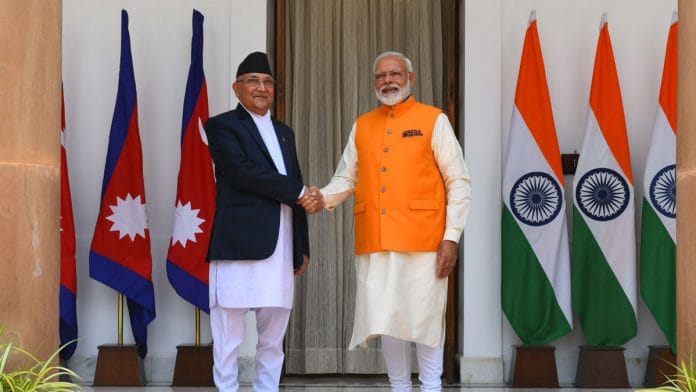Foreign Secretary Vikram Misri returned from Nepal on 18 August after a two-day visit. And not even a week later, on 20 August, Kathmandu once again raised a territorial dispute with India. Nepal objected to the mention of Lipulekh Pass in a statement released by India during China’s Foreign Minister and Special Representative, Wang Yi’s visit. The statement on the India-China boundary question was released on 19 August.
As part of the normalisation process in bilateral ties post the 2020 Galwan Conflict at the Line of Actual Control, India and China have agreed to resume border trade through multiple routes, including the Lipulekh Pass—a territory that Nepal claims as its own.
In 2020, Kathmandu, through a constitutional amendment, unilaterally enlarged its territories and depicted the disputed territories as its own on the new map. India had strongly objected to such unilateral enlargements, stating, “This artificial enlargement of claims is not based on historical fact or evidence and is not tenable. It is also violative of our current understanding to hold talks on outstanding boundary issues.”
How does Kathmandu’s decision to raise it again affect the relationship with New Delhi?
Back to step one
Foreign Secretary Misri was in Nepal on 17 and 18 August to extend an invitation to Prime Minister KP Oli for a state visit to India. It was a special invite as Prime Minister Oli has been in office since July 2024, and his office has been working on a possible invitation from India for his first foreign visit. Traditionally, all newly elected/appointed prime ministers of Nepal visit India as a mark of deeper socio-cultural, political, economic and strategic ties with the country.
There was a reported delay from the Indian side due to what was seen as Delhi’s unhappiness over Oli’s handling of the relationship with India during his past stints, especially over territorial issues.
Interestingly, Foreign Secretary Misri’s visit was seen as a marker of Delhi’s growing working comfort with the current administration, especially because no major irritants were observed that could derail the relationship. Instead, notable developments were made in hydropower cooperation, overall trade, and India’s development assistance to Nepal.
Since Oli took office in July last year, significant visits have been made from India. In April this year, Union Minister of Agriculture and Farmers Welfare, Shivraj Singh Chouhan, visited Nepal for a multilateral engagement and held bilateral talks with Prime Minister Oli. A few weeks later, India’s Minister for Power and Housing & Urban Affairs, Manohar Lal Khattar, visited Nepal, where discussions on hydropower cooperation took place.
Besides these visits, the two prime ministers also met on the sidelines of the United Nations General Assembly last year and the BIMSTEC Summit in Thailand earlier this year. Therefore, the general sense was that ties were improving.
Now, Nepal has raised the territorial issue and reportedly sent a diplomatic note to India. We’re back to where we started, and it is likely that the territorial dispute will overshadow the upcoming visit.
Also read: Lipulekh: Why Himalayan pass is at centre of latest India-Nepal diplomatic flashpoint
Space for negotiations
Nepal has its claims, but New Delhi’s “position in this regard has been consistent and clear. Border trade between India and China through Lipulekh pass had commenced in 1954 and has been going on for decades.” In its statement, the Ministry of External Affairs reiterated that “Any unilateral artificial enlargement of territorial claims is untenable” and any dispute regarding boundaries can be solved through dialogue and diplomacy.
While India is open to talks through diplomatic channels, the challenge remains with the political dispensation in Nepal. Irrespective of whoever is in power or hopes to make a comeback, all parties seem to invoke ultra-nationalistic narratives for political purposes, essentially making territorial issues with India the centrepiece. Since the political transition from a centuries-old monarchial system to democracy in 2008, the Left parties, including the Oli-led Communist Party of Nepal-UML (CPN-UML), have held a strong view of India. And almost all governments since 2008 have had a Left party coalition, so there is always a compulsion to keep the issue alive.
For countries as close as India and Nepal, a territorial dispute could be resolved through the existing border mechanisms and through diplomatic dialogues. But if one party chooses to include disputed territories in its map unilaterally, make a constitutional amendment, and now use the same to justify its claims, it certainly puts Delhi in a difficult position.
It is a no-brainer that diplomacy creates space for leveraging all possible options, including those available in the Track 2 setups. A lot will depend on deliberations during Prime Minister Oli’s upcoming visit to India.
Rishi Gupta is a commentator on global affairs. Views are personal.
(Edited by Theres Sudeep)






